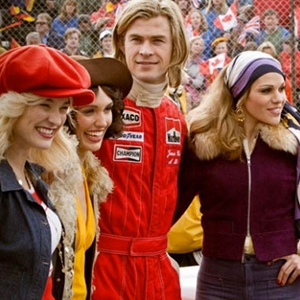
Review: Rush (2013)

Cast: Daniel Brühl, Chris Hemsworth, Olivia Wilde
Director: Ron Howard
Country: USA | Germany | UK
Genre: Action | Biography | Drama | Sport
Official Website: Here
Editor’s Notes: Rush is now open in wide theatrical release. For our retrospective on Ron Howard click here.
Great rivalries compel sports. These professional games are designed to extract the fiercest competition, pin the most talented participants against one another and put on display their remarkable ambition for supremacy. In the states, we have a particular affinity for the underdog, but there is also the dynasty and the inverse of the underdog, the fall of the favorite. Oftentimes in film, the sports heroes face off against something more systematic. In Invictus and Remember the Titans, the teams were agents against social injustices. Rocky never had a real rival; those films were more anthological, concerned with the determination and integrity of an individual who must overcome several diverse foes. A rivalry emerges when that opposition is tightened in scope from the macro for the micro. Mano a mano.
It’s fast and rather unconcerned with little outside what’s presumed of the genre, and so criticism of formally problematic devices seems irrelevant.
Ron Howard’s Rush forgoes meaningful humanization for the piecewising of a rivalry. We have two Formula racers, James Hunt (Chris Hemsworth) and Nicki Lauda (Daniel Brühl), who happen to cross each other at a minor Formula Three race in the early 1970s. Both men are arrogant but for considerably different reasons: Hunt, for the sheer lack of a proper introduction to losing—a talented, charismatic Brit who woos women with innate ease—and Lauda, for his family’s namesake in Germany. Hunt’s intuition and aggression clashes with Lauda’s intellect and precision. Hunt takes an inside cut on Lauda during a turn the German felt was unconscionably reckless. They bicker after the race, and we go from there.

Lauda buys his way into Formula One, but his acumen with a racing car astounds the mechanic team, and his precision on the track wins races. By the time Hunt meets him in their sport’s highest level, Lauda’s driving for Ferrari. It’s not Lauda’s domination of the standings that aggravates Hunt, even though he at first was the heralded up and comer. Rather, Hunt’s ideological stock takes hit after hit every time Lauda’s Ferrari crosses the finish line first; reasonableness and precision over adrenaline.
Before the start of a race that would all but seal a championship for Lauda, he tries to persuade the other drivers to agree to cancel the race on account of weather. (Though it seems absurd today that a determination of safety would be left up to the athletes, this is 1976.) Countering, Hunt plays to the drivers’ sense of invincibility, and the race goes on. The difference between enemies and rivals is a mutual antipathy for the other’s destruction. Hunt wants to humble Lauda as racer, but his drive to do so endangers the pair physically in an already perilous sport. Predictably, disaster happens. Lauda crashes, his car engulfing him in flames.
The conflict starts small, but like most individual rivalries, it’s the alternate versions of equal ambition that stoke the fire. Lauda actually races for the simple fact that he’s good at it and it makes him money. You can imagine how Hunt feels about this. Each takes exception to the other’s criticisms, and as they ascend the Formula ranks each makes decisions provoked by the other’s actions, whether exchanging blows or matching foothold for foothold. It’s more than the pair sparring on the race track. It’s that neither will submit to the other’s philosophy. A victory for one marks an ideological strike against the other.
Freshness has never been a calling card of Howard’s. A director of unabashedly commercial products, his skill has been to remind us of why trite or tired narratives originally had the clout to eventually become trite or tired.
Though Hunt and Lauda never combat one another on personal grounds, the script pins into contention their private lives. We see Lauda’s defiant social awkwardness in juxtaposition with Hunt’s affability. As Lauda marries, Hunt is encouraged to bolster his image with stability. Hunt marries Suzy Miller (Olivia Wilde). Is it her four appearances—the fourth as useless as the character—that clue us into Hunt’s dedication to the idea of stability? However, the two racers know of the other’s personal life in the way a tabloid reader would. Howard depersonalizes Lauda and Hunt in this way. Clearly their private lives are contributory narratives to the primary arc: their rivalry. If they aren’t squaring off on the track, the script maintains an abstract oppositional connection between Hunt and Lauda that consistently feels more informative to the plot than character.
If this all sounds relatively familiar, it is. Rush offers little new to the already well-populated stratum of rivalry pop culture. Freshness has never been a calling card of Howard’s. A director of unabashedly commercial products, his skill has been to remind us of why trite or tired narratives originally had the clout to eventually become trite or tired. There is indeed skill in that. Rush is often exciting, and the only meaningful performances—Hemsworth and Brühl’s—engage us the whole way through. But it’s a film whose ceiling and floors regress to a mean, one I’d find strange for audiences to outright dislike or adore. It’s fast and rather unconcerned with little outside what’s presumed of the genre, and so criticism of formally problematic devices seems irrelevant. It’s enjoyable, confident, overly tidy entertainment—even if its contentment with playing it safe seems an odd pairing with the subject matter.
Related Posts
![]()
Kyle Burton
![]()
Latest posts by Kyle Burton (see all)
































